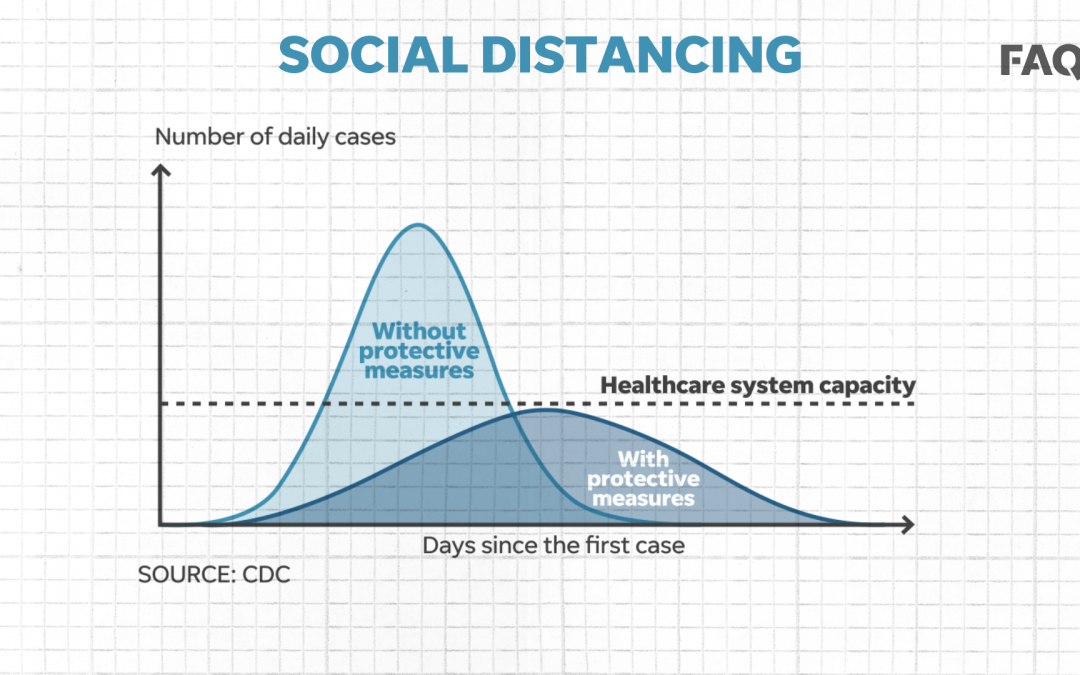
Apr 13, 2020 | COVID-19, Front Page News, Meghan Durkin, School News
By Meghan Durkin (V)
It’s been over two months since the United States confirmed its first coronavirus case in late January. Since then the landscape has changed drastically, as the virus has forced all non-essential businesses to shut down, kept most states under lockdown, and left most of the world at a standstill. This week, with cases in numerous states across America predicted to hit their peak, the healthcare system, its workers, and all others without the ability to stay home prepare for the hardest battle in the ongoing war against COVID-19.
During a news conference on April 4, New York Governor Andrew Cuomo called the apex “the battle of the mountain top,” and affirmed that New York and other highly-affected states, including New Jersey, “are not yet ready for the highpoint.” Our lack of preparation for such a high number of cases remains the greatest challenge of this apex. How can a healthcare system brace for a pandemic it never expected? How do hospitals continue to treat patients as their resources dwindle? As of April 11, the United States became the country with the greatest number of confirmed deaths, with over 1,000 being from New Jersey and about 7,000 being from New York. If the pressure on our healthcare system becomes too immense, those numbers will rise even faster.
Even when cases begin to decline, avoiding another outbreak is critical to curbing even greater disasters and preventing future quarantines. Many countries who seemed to have handed coronavirus an early and swift defeat faced a resurgence of cases in late March. For example, in Singapore, where cases had dropped by late February into March, a second wave of cases has forced the country to close all non-essential businesses and schools. The emergence of new cases in Singapore serves as an important warning to the United States: allowing people to return to school, work, or “normal” life too early may cause another outbreak of the virus. If the country doesn’t proceed with caution, there could be a second peak on its way.
Here’s the brighter side: a peak must be followed by a decline. At this point, a decline in cases can’t come soon enough. The Coronavirus is not only a medical problem, but also an economic disaster unlike any other. What had been a booming economy in the United States is now facing a major downturn. With many businesses forced to shut down, specifically those in the hospitality industry, companies have little choice but to lay off or furlough large parts of their workforce. In about three weeks, over 16 million Americans lost their jobs and the number continues to rise. For employees and employers across the country, the sooner the virus is controlled, the faster they can get back to work.
Ultimately, the onset of a peak in cases poses both problems and promise. The United States is far from being out of the woods, as evidenced by continued problems in countries, like Singapore, who are facing a second wave. Thus, the balance between caution and normalcy is becoming increasingly important to reduce deaths and keep the healthcare system afloat. Though, with the worst (hopefully) almost behind us, the U.S. and its people can slowly start to see the light at the end of the tunnel. If not released from possibly many more months under stay-at-home orders, then at least hope and reassurance that the worst is on its way out.

Mar 28, 2020 | Andrew Wong, COVID-19, Front Page News, Meghan Durkin, School News
By Meghan Durkin (V) & Andrew Wong (IV)
On Thursday, March 12, amid concerns over the novel Coronavirus, known as COVID-19, Head of School Matt Levinson announced that Pingry would adopt a remote learning model until at least April 10. On Friday, March 27, heeding Governor Murphy’s updated advisory, this remote learning regime was extended to April 17.
School-sponsored activities, including athletics, were suspended as well, in hopes of keeping the Pingry community safe. This news followed the cancellation of multiple spring break trips, including the French exchange program and the athletic trips to Florida.
Prior to Spring Break, as New Jersey reported its first case of COVID-19, Pingry prepared for likely disruptions as a result of the virus. Mr. Levinson assembled a task force, led by Associate Director of Operations, Safety, and Strategic Initiatives David Fahey, to monitor the situation as it evolved. This model “allows us to act with deliberate speed and care in our decision-making, while also being nimble and adaptive to changing circumstances,” said Mr. Levinson. So far, the biggest challenge for the task force “has been the speed at which [COVID-19] has unfolded.” While COVID-19 spread from China to South Korea to Italy, the virus seemed to be a distant threat. Though, by late March, the United States had over 27,000 confirmed cases.
As Pingry does its part to slow the spread of COVID-19, a new reality of “social distancing” has affected faculty and students. Governor Phil Murphy ordered a statewide lockdown, which encourages people to stay home and shuts down all non-essential business, leaving vacations cancelled, standardized tests postponed, and store shelves empty. Pingry’s remote learning model looks to continue fostering educational growth, while keeping Pingry and the greater community healthy. Teachers, by using virtual classes and online assignments, hope to make remote learning engaging and effective. Mr. Tim Grant, a chemistry teacher, explained the “need to try to create a classroom feel where everyone can feel heard and be involved,” as he believes “a class does involve the transfer of information, but much more importantly it must have the feeling of community.” For many teachers, including Mr. Grant, effectively using remote learning will be a “journey that to me looks like I’ve been air-dropped into the Amazon and I can’t imagine what comes next. The journey will be both scary and exciting with many new discoveries.”
Dean Ananya Chatterji echoed this sentiment in an email to Upper School students, expressing the faculty’s shared hopes for the extended closure. She explained that transitioning to online learning “is NOT going to be perfect. Everyone knows this, and no one — not a single one of us — expects that this will go smoothly. We are hoping to treat it like an adventure: something we can try our best at, knowing there will be pitfalls and successes. Most of all, adventures should be fun. So our hope, as a faculty, is to have fun with it.”
Students will also have to adapt to new circumstances, not only academically, but also extracurricularly. With delayed athletic seasons that face possible cancellations, students look to make the best of the unexpected situation. Mr. Grant, who coaches girls’ varsity track, explained his realization “that [he] must give enough information so that each athlete can learn how to coach themselves.” Both students and coaches must find “some gems against the rubble,” as they stay in-shape and prepare for a potential season at home. Along with sports, clubs face new challenges, as they hope to keep members connected online.
Furthermore, this new territory of remote learning changes many students experience socially. Sanjana Biswas (V) said, “I’ll miss my friends the most and just the experience of being in school. As much as we complain about it, we all have fun talking to our friends during lunch and flexes and going to class.” Though, she added, “It’s pretty easy to stay in touch through FaceTime and text.”
While the COVID-19 pandemic continues to unfold, the Pingry community looks to be cautious, as the possibility of extended closure looms. Students and faculty alike promise to remain open and positive throughout these uncertain times. Gia Kalro (V) believes that while “we’ll have a lot of trial and error, eventually it will all work out.”
As of March 22, global Coronavirus cases have surpassed 300,000. In just a few weeks, everyday life in the United States and abroad has been replaced by social distancing and self-quarantining, while each day the number of cases grows. Though, during this time of uncertainty, both the Pingry and global community has stressed the importance of staying calm and maintaining hope. Mr. Levinson encourages students “to have fun, try new things, be creative, and take the time to get outside for some fresh air,” while finding “ways to build community remotely, whether it’s around a shared interest like a club, or around a passion project.” He asks the community to “be patient as we all discover new ways of learning and being in community together.”


